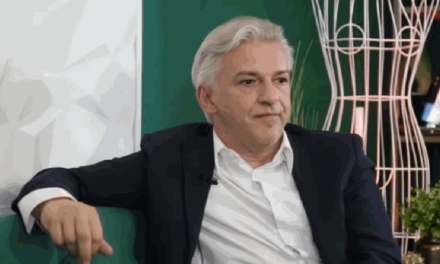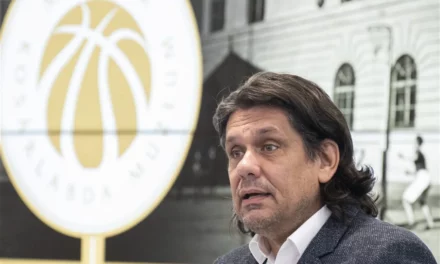Eastern thinking is foreign to Hungarians, which means that we do not fully understand the events that are happening now and that our fears about what is happening may be greater than is justified. Or would I be wrong? We are trying to find an answer to this question with the help of Tárik Meszár, the lead researcher of the Eurássia Center and the Migration Research Institute.
- We always look at events in the Middle East with a little fear. This was also the case in the 1980s, even during the Iraq-Iran war, but also when Iraq invaded Kuwait because we were afraid that the war could widen and the conflicts could have a negative impact on the world economy. This is what we fear even now in Israel's campaign against Hamas. The conflict in Gaza has actually been going on for a very long time. In 1947, the Arabs did not accept the UN partition plan because they would not have received the territories they wanted. The state of Israel was established in 1948, after which serious clashes began. The first big Arab-Israeli war was in 1967, smaller and bigger conflicts continued in the following decades, then came the next bigger war in 1973, which was not with the Palestinians, but with the Arab countries, i.e. with Egypt, Syria, Jordan , took place with Iraq, i.e. with an Arab coalition. The opposing parties then slowly dwindled, and now the direct confrontation is between Israel and Hamas.
- What can be seen, however, is that other groups besides Hamas are involved in the current conflict, for example the militias supported by Iran.
- Or the Yemeni twenty-somethings, who have caused a very serious disturbance in the world economy in recent months. Ships passing through the Bab el-Mandeb strait on the Red Sea are being attacked continuously, they say, until Israel ends the Gaza campaign.
However, the real danger may be the terrorist organization Hezbollah.
- Lebanon is in an economic crisis, Hezbollah's popularity among the Lebanese people has fallen dramatically, and they do not want war. They shoot rockets at Israel, and they shoot back, but no actual acts of war take place. Of course, the situation is extremely tense, so it cannot be said that there will be no war. But that's not the end of the line. We must also mention Iraq, where many Iranian-backed militias also operate, and they also attack the Jewish state and American military bases with missiles. And the USA responds to this by shooting at the bases of the Shiite militias. The same is true of Syria. So there are several different fronts, but the fight is not as open as in Gaza.
- Israel announces that it will deal with Hamas once and for all. Is it possible?
– It is not an easy task, but the Jewish state wants Hamas' ability to govern to be eliminated permanently, so that they will not be able to administer the Gaza Strip after the fighting. However, there is strong domestic political pressure, the demand that the kidnapped hostages be released at any cost. More than a hundred Israeli citizens are being detained, with whom they can blackmail the government led by Netanyahu. That is why the Israeli offer was made, which talks about a 1-2 month truce, but the hostages should be released by Hamas. And there is not only internal, but also strong external pressure, the USA, Qatar and Egypt are also calling for a ceasefire and an end to the war.
"However, if Hamas releases the hostages, it would voluntarily give up its only serious trump card." It is also feared that if the situation goes very badly for Hamas, they may kill the hostages in revenge. In the bestial way they massacred more than a thousand innocent people and executed 40 babies, there is no doubt that they would do it without remorse.
"This seems like an unsolvable situation, like the war itself." Let's be optimistic, because we managed to free a good half of the hostages once in November, and hopefully we will succeed now as well. Unfortunately, yes, it cannot be ruled out that the hostages will be executed or harmed in some other way, but it is clear that Israel must and will do everything to save their lives. What is a fact, and which may promote the solution, is that Hamas is militarily very weakened, seventeen of their twenty-four major units have been completely liquidated, which means that the terrorist organization has little chance other than a cease-fire to sort out their ranks somewhat.
- It is not known where the conflict is going and what its outcome will be, but it is known that Europe is also affected by the war. And this is the next drama happening across Europe. While it is obvious who was attacked after such a vile attack, demonstrations are held in support of the terrorist organization and a wave of anti-Semitism sweeps across Europe. It is true that formally they support the Palestinians, but let's not forget that these same Palestinians helped Hamas to become a government with their votes.
- But you have to know, Hamas shows a different face to the outside and a different face to the Palestinians in Gaza. For the latter, social assistance is distributed, hospitals and schools are built, which is why they are popular among the population. Apparently, the average Palestinian did not care about the fact that an Israeli was executed from time to time, because they were not seen as a terrorist organization. And as for Europe, the immigrant groups here see it all as a battle between the Global North and the Global South, they think they have invaded the Arab world. They cling to their roots and express their opposition, that is, they reject European culture. What goes on at these demonstrations is clearly the responsibility of Western governments, because they are unable and perhaps unwilling to take action against it. I wonder why there are no such demonstrations in Hungary? Because we banned it, you can't take to the streets for anti-Semitic demonstrations. Of course, there were demonstrations in the West that were banned, but others were not, and they tolerated the use of swastika symbols and calls for the extermination of Jews. The question is, what is more important? Freedom of speech or their own safety? Will they sacrifice their country on the altar of so-called freedom of speech? It really doesn't matter.
- This is a false question, because we see that freedom of speech is much greater in Hungary than in the mentioned West, but we say that free speech extends as long as it does not support terrorism.
- I believe that Western governments do not want to lose voters, but at the same time there is a kind of hypocrisy in the matter. Humanity and humanity are mentioned, even though they themselves are often not very humane with these immigrant communities either. Western European politics are characterized by amazing duplicity and hypocrisy, I dare to state this very firmly. Western European police have already stated several times that anti-Semitic attacks have increased, mainly the London police have made such statements, but they also wanted to blow up a synagogue in Germany, which was prevented. Unfortunately, violence and hatred have bitten us now in Europe.
"I know I'm asking for a fortune-telling, but I'm interested in your personal opinion." How long can this conflict last and what will be the end?
– I can only quote the Israeli government, the members of the government said, the prime minister himself said, that the fighting will probably continue in 2024. As for the establishment of a Palestinian state, Israel will probably not go into it. They are afraid that if there is an independent Palestinian state and it has an army, they will attack Israel again. By the way, this is not at all unimaginable, if not likely in the short term, but certainly at some point in the future, so that Israel shies away from the creation of an independent Palestinian state. However, international public opinion, the United States and Great Britain, on the contrary, are calling for an independent Palestinian state, of course under certain conditions. However, I repeat, Israel will not allow this for a long time.
"It's a mystery, where could this Palestinian state be established?" The area is given and cannot be increased, that is, it would be located in the same place where the fighting is raging now. So what would change?
– A political system should be created, and they are trying to achieve this, which would be friendly to the West and Israel. on the other hand, it is also accepted by Palestinian society. There is a person who started to develop a good relationship with Israel, he moved to the United Arab Emirates, many people want him as president, but Palestinian society does not accept him. He would be able to work with Israel and the West, and would probably be able to form a government that would be a technocratic government. According to his idea, free elections would be held after 2 years. I think that this will not happen, I don't see any chance of it happening. The Israelis want there to be an Israeli military administration in the Palestinian territories, while at the board level the Palestinians can freely decide on their own affairs. I think this will happen in the future. One thing is for sure, whatever solution is found, one of the parties will have to give up a lot more than they want.
The interview was conducted by: György Tóth Jr












